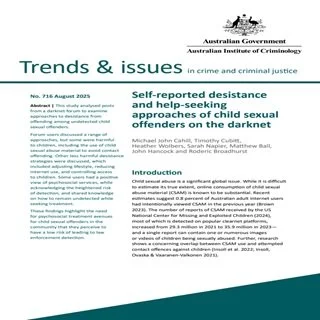By Michael John Cahill, Timothy Cubitt, Heather Wolbers, Sarah Napier, Matthew Ball, John Hancock and Roderic Broadhurst
This study analysed posts from a darknet forum to examine approaches to desistance from offending among undetected child sexual offenders. Forum users discussed a range of approaches, but some were harmful to children, including the use of child sexual abuse material to avoid contact offending. Other less harmful desistance strategies were discussed, which included adjusting lifestyle, reducing internet use, and controlling access to children. Some users had a positive view of psychosocial services, while acknowledging the heightened risk of detection, and shared knowledge on how to remain undetected while seeking treatment. These findings highlight the need for psychosocial treatment avenues for child sexual offenders in the community that they perceive to have a low risk of leading to law enforcement detection.
Trends & issues in crime and criminal justice no. 716. Canberra: Australian Institute of Criminology, 2025. . 14p.




